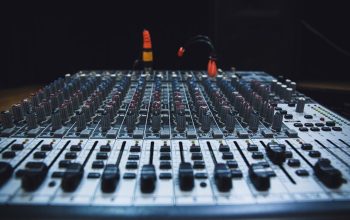Podcasts have emerged as a revolutionary medium for information dissemination and entertainment, captivating audiences worldwide. This audio format, which allows users to listen to episodes on-demand, has transformed the way we consume content. With the proliferation of smartphones and high-speed internet, podcasts have become increasingly accessible, enabling listeners to engage with a vast array of topics while multitasking or commuting.
The beauty of podcasts lies in their versatility; they can range from casual conversations to in-depth interviews and educational lectures, catering to diverse interests and preferences. The podcasting landscape has expanded dramatically since its inception in the early 2000s. Today, there are thousands of podcasts available across various platforms, covering everything from history and science to personal development and niche hobbies.
This growth has not only democratized content creation but has also provided a platform for voices that might otherwise go unheard. As a result, podcasts have become an invaluable resource for learners seeking to enhance their knowledge and skills in an engaging and flexible manner.
Key Takeaways
- Podcasts are a popular form of audio content that can be a valuable tool for learning and personal development.
- Podcasts offer benefits for learning, including accessibility, flexibility, and the ability to learn on the go.
- When choosing podcasts for learning, consider the topic, format, and host to ensure it aligns with your learning goals and preferences.
- Effective listening and note-taking strategies can enhance the learning experience when engaging with podcasts.
- Integrating podcasts into your learning routine can be done by setting aside dedicated time for listening and incorporating it into your study schedule.
Benefits of Podcasts for Learning
Convenience and Flexibility
One of the most significant advantages of podcasts is their convenience. Unlike traditional forms of education that often require dedicated time and space, podcasts can be consumed while engaging in other activities, such as exercising, driving, or doing household chores. This flexibility allows learners to integrate educational content into their daily routines seamlessly, maximizing their time and enhancing productivity.
Access to Expert Knowledge
Moreover, podcasts often feature expert guests and thought leaders who share their insights and experiences. This access to a wealth of knowledge can provide listeners with unique perspectives that may not be available through conventional educational resources. For instance, a podcast episode featuring a renowned scientist discussing recent breakthroughs in their field can offer listeners a firsthand account of cutting-edge research. This direct connection to experts can inspire learners and deepen their understanding of complex subjects.
Fostering a Sense of Community
Another notable benefit of podcasts is their ability to foster a sense of community among listeners. Many podcasts encourage audience interaction through social media platforms or dedicated forums, allowing learners to engage with one another and discuss the content. This communal aspect can enhance the learning experience by providing opportunities for collaboration, discussion, and networking with like-minded individuals who share similar interests.
How to Choose the Right Podcasts for Learning

Selecting the right podcasts for learning can significantly impact the effectiveness of the educational experience. With countless options available, it is essential to consider several factors when making a choice. First and foremost, identify your learning goals.
Are you looking to gain knowledge in a specific subject area, develop new skills, or stay updated on industry trends? By clarifying your objectives, you can narrow down your search to podcasts that align with your interests. Next, consider the format and style of the podcast.
Some learners may prefer structured episodes that follow a clear curriculum, while others might enjoy more conversational formats that allow for spontaneous discussions. Additionally, pay attention to the host’s expertise and background. A podcast hosted by an experienced educator or industry professional may provide more valuable insights than one led by someone with limited knowledge of the subject matter.
Another crucial aspect to consider is the frequency and length of episodes. Some podcasts release new content weekly, while others may have irregular schedules or longer episodes that require more time commitment. Assess your availability and listening preferences to find podcasts that fit seamlessly into your routine.
Tips for Effective Listening and Note-taking
| Tip | Description |
|---|---|
| Minimize distractions | Avoiding distractions such as phones or other electronic devices can help you focus on listening. |
| Use active listening techniques | Show that you are engaged in the conversation by nodding, making eye contact, and asking clarifying questions. |
| Take organized notes | Use bullet points, headings, and subheadings to organize your notes for easier review later. |
| Review and summarize | After the conversation or lecture, take time to review and summarize your notes to reinforce your understanding. |
To maximize the benefits of podcast listening, adopting effective strategies for engagement is essential. Active listening is key; rather than passively absorbing information, focus on understanding the material being presented. This can involve mentally summarizing key points or asking questions as you listen.
Note-taking is another powerful tool for reinforcing learning from podcasts. Consider using a dedicated notebook or digital app to jot down important concepts, quotes, or questions that arise during episodes.
Employing techniques such as the Cornell method or mind mapping can help organize your notes effectively. For instance, you might create sections for main ideas, supporting details, and personal reflections, allowing you to revisit and review the material later. Additionally, consider pausing or rewinding sections of the podcast that resonate with you or require further clarification.
Many podcast platforms allow users to adjust playback speed, enabling you to slow down complex discussions or speed through less critical segments. This level of control over your listening experience can significantly enhance your understanding and retention of the material.
Integrating Podcasts into Your Learning Routine
Incorporating podcasts into your learning routine requires intentional planning and consistency. Start by identifying specific times during your day when you can dedicate time to listening—this could be during your morning commute, while exercising, or even during meal prep. By establishing a routine, you create a habit that makes learning through podcasts a regular part of your life.
Consider setting specific learning goals related to your podcast consumption. For example, you might aim to listen to one episode per day on a particular topic or complete a series within a month. Tracking your progress can help maintain motivation and accountability.
Additionally, consider creating a playlist of episodes that align with your learning objectives so that you can easily access relevant content without having to search each time. Engaging with the material after listening is equally important for reinforcing what you’ve learned. Take time to reflect on the key takeaways from each episode and how they relate to your existing knowledge or experiences.
You might also consider discussing episodes with friends or colleagues who share similar interests; this collaborative approach can deepen understanding and spark new ideas.
Using Podcasts for Different Learning Styles

Podcasts cater to various learning styles, making them an inclusive resource for diverse audiences. For auditory learners, the spoken word is an ideal medium for absorbing information. The combination of tone, inflection, and storytelling can enhance comprehension and retention in ways that written text may not achieve.
Visual learners can also benefit from podcasts by supplementing their listening experience with visual aids such as infographics or slideshows related to the episode’s content. Many podcasters provide additional resources on their websites or social media platforms that complement their audio material. By engaging with both auditory and visual elements, learners can reinforce their understanding through multiple channels.
Kinesthetic learners may find it helpful to engage in hands-on activities related to the podcast content while listening. For instance, if you’re listening to a podcast about cooking techniques, consider trying out the recipes as you learn about them. This active engagement can create a more immersive learning experience that resonates with those who thrive on physical interaction.
Podcasts for Specific Subjects and Skills
The vast array of educational podcasts available today means that learners can find content tailored to nearly any subject or skill they wish to explore. For instance, those interested in science might turn to “Science Vs,” which pits facts against popular myths in various scientific fields. Similarly, “Stuff You Should Know” delves into a wide range of topics—from history to pop culture—providing listeners with well-researched insights in an entertaining format.
For language learners, podcasts like “Coffee Break Spanish” offer structured lessons that cater to different proficiency levels while incorporating cultural elements into language acquisition. These types of resources not only teach vocabulary and grammar but also immerse learners in the nuances of language use in real-world contexts. In addition to academic subjects, there are numerous podcasts focused on professional development and skill-building.
“The Tim Ferriss Show” features interviews with high achievers across various fields who share their strategies for success and productivity hacks. Such insights can be invaluable for individuals looking to enhance their career prospects or develop new competencies.
Resources for Finding Educational Podcasts
Finding quality educational podcasts can be overwhelming given the sheer volume available today; however, several resources can streamline this process. Podcast directories such as Apple Podcasts, Spotify, and Google Podcasts allow users to search by category or keyword, making it easier to discover new shows tailored to specific interests. Additionally, websites like Podchaser provide user-generated reviews and ratings for individual episodes and entire series, helping potential listeners gauge the quality of content before committing time to it.
Educational institutions often curate lists of recommended podcasts related to specific subjects or fields of study; these lists can serve as excellent starting points for learners seeking reputable sources. Social media platforms also play a significant role in discovering new podcasts. Many podcasters actively engage with their audiences on platforms like Twitter or Instagram, sharing episode highlights and recommendations from other creators within their niche.
Joining online communities or forums dedicated to podcast discussions can further enhance your ability to find hidden gems that align with your learning goals. In conclusion, podcasts represent a dynamic and flexible medium for learning across various subjects and skills. By understanding how to choose the right content, employing effective listening strategies, and integrating podcasts into daily routines, learners can harness this powerful tool for personal growth and development.
If you are interested in learning more about podcasts for education, you may want to check out the Education Podcast Network. This website provides insights and tips on how to incorporate podcasts into your learning routine and highlights the benefits of using podcasts as a tool for education. It is a great resource for educators and students looking to enhance their learning experience through audio content.
FAQs
What are podcasts for learning?
Podcasts for learning are audio programs that are designed to educate and inform listeners on a wide range of topics. They can cover academic subjects, professional development, personal growth, and more.
How can podcasts be used for learning?
Podcasts can be used for learning by providing access to expert knowledge, in-depth analysis, and engaging storytelling. They can be listened to at any time, making them a convenient and flexible learning tool.
What are the benefits of using podcasts for learning?
Some benefits of using podcasts for learning include accessibility, portability, and the ability to learn on the go. They also offer a diverse range of content and perspectives, making them a valuable resource for lifelong learning.
Are podcasts for learning free to access?
Many podcasts for learning are free to access, although some may require a subscription or payment for premium content. There are also platforms that offer a mix of free and paid podcasts for learning.
How can I find podcasts for learning?
Podcasts for learning can be found on various platforms such as Apple Podcasts, Spotify, Google Podcasts, and dedicated podcasting websites. They can also be discovered through recommendations from educators, colleagues, and online communities.



